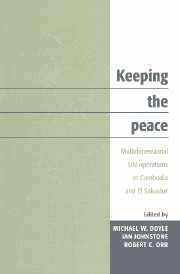1 - Introduction
Published online by Cambridge University Press: 22 October 2009
Summary
Since the end of the Cold War, the community of nations has struggled to redefine the relation between those issues that fall within the realm of a state's sovereignty and those that represent a legitimate concern of the international community. The expanding scope of collective intervention, by coercive means, under chapter VII of the United Nations Charter is one manifestation of this struggle. From the Gulf crisis ceasefire resolution in 1991 to the US-led intervention to restore Haitian President Aristide, the United Nations Security Council has employed an increasingly broad interpretation of what constitutes a threat to international peace and security, authorizing action that would undoubtedly have been seen as unlawful interference in sovereign affairs only a decade ago.
But setbacks encountered in Somalia and the former Yugoslavia have highlighted the difficulties of collective intervention by force. Limited forcible intervention, for humanitarian purposes, remains a viable and often necessary task – although even these operations have been most successful when “contracted out” to multinational coalitions – but efforts to impose peace on recalcitrant parties have either failed or been abandoned before completed. The result has been a retreat from “peace enforcement,” though not a retreat from globalism or UN activism. The future of UN peacekeeping, it seems, lies between the extremes of forcible intervention and absolute respect for sovereignty. That is, the future of UN peace operations lies in “multidimensional peace operations.”
- Type
- Chapter
- Information
- Keeping the PeaceMultidimensional UN Operations in Cambodia and El Salvador, pp. 1 - 22Publisher: Cambridge University PressPrint publication year: 1997
- 1
- Cited by



